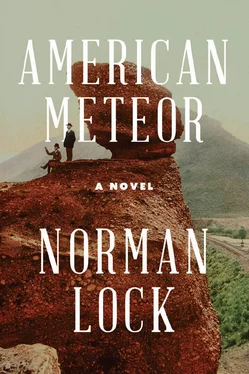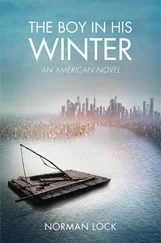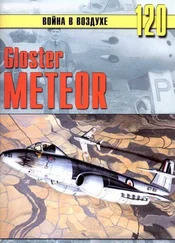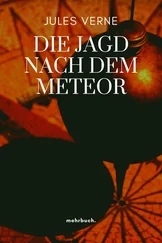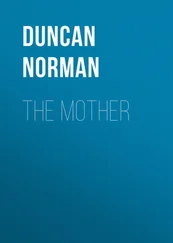The candles had guttered to nothing. The car was awash with night. The pine, spruce, aspen, and birch trees clinging to the steep hills might have lengthened their aboriginal shadows down the face of the butte, across the high country, and into the opulent carriage where Death’s own shadow had lain for twelve nights — so very black it was. Durant hadn’t stirred the whole time my mind milled what grist the night and its terrors brought. Scared, I determined to break the silence, though it cost me my camera.
“Dr. Durant,” I said in a whisper of a voice.
He didn’t answer. I felt an oppression of the chest as disquiet gave way to dismay.
“Dr. Durant, are you all right?” I said, louder this time, though not so very loud, in case my voice should break into a shout that could shiver the china cups: an uncanny sound to stop the heart of a young man of nineteen, surrounded by darkness, who felt at that instant like the last person left on earth.
I picked up the knife I used to shuck oysters. Little good it would do me against fiends or the ghosts of murdered Indians. Then I heard Durant — I couldn’t see him in the dark. He caught his breath, snuffled like a wasp in a jam pot, and began to snore: a soft and even rasp that made the bedeviled carriage ordinary again. The terror that had nearly finished me vanished. I let him sleep and gave up all hope of prying a camera out of a millionaire. Like all of his kind, he held that the audacity of having staked all entitled him to take all, without a downward pitying glance at those who lost or lacked the sand to try.
I tried to imagine Durant’s dreams. Did he see visions of railroads, gilt-edged securities (guilt-edged is more like it), nymphs du prairie in shimmies and fancy drawers, slinking about a Denver bordello? Or was he once more in Lee, Massachusetts, in the summer of 1830, when his childish ambition extended no further than a fish hook at the end of a line? How little we know of life! Once before, I’d felt the earth swinging to no purpose through a space hostile to humankind. That time also involved a man waiting, motionless, in the dark of this same silent coach. Afraid to wake him — Durant’s temper could be sharp when he was abruptly roused — I closed my eye and fell into the chasm of sleep.
Omaha, Nebraska, October — December 1868
I was sweeping out the private car when a black boy knocked at the door. He took off his hat, handed me a folded piece of paper, and ran off without a word. Lincoln and war had freed the slaves, but the habits of abjection were too ingrained to be broken in a generation. They waited, excitable as Fleischmann’s yeast, to rise and show themselves. A scowl or an angry word could make a Negro doff his cap to a white woman or step aside to let a white man pass. Black folk might have been disenthralled, but their fear remained— with good reason. For no sooner had the war ended than six disgruntled rebs cut eye holes in their missuses’ sheets. Rope became a thing with which to hang a man, and crosses, such as the lynched Jesus had sanctified, a torch to burn in a black sharecropper’s yard. Traffickers in human sweetness — the poets, preachers, and printers of Valentine’s Day cards— declare love to be our kind’s supreme emotion. Young as I was, I suspected enmity held sway.
The note asked if I would come to the Jackson Brothers’ photographic studio at three o’clock that afternoon, “if convenient.”
You can call William Henry Jackson’s arrival in Omaha “triumphal” insofar as a cowboy whooping and waving his dusty Stetson to goad a herd of exasperated cattle into the stockyard, at the end of a thousand-mile trail through hostile territory, has completed a journey as harrowing and as worthy of commemoration as Ulysses’ or Hannibal’s. Heroic moments like Jackson’s belong to the mythology of the West — the Old West now, in 1901.
William came West in ’66, with Gettysburg and jobs as a photographer’s assistant behind him. Before he and his brother Edward opened their Omaha studio, William had tried his hand not only at cowpoking but also at silver mining and bull whacking on a mule train bound for Montana. He left it in Wyoming and made his way to Salt Lake City, where the Mormons were building their temple near the River Jordan to honor the angel Moroni. Burton, the Victorian explorer and adventurer, must have considered the city as fantastic as Lake Tanganyika or Mecca and the Mormons as exotic as The Arabian Nights to have traveled there six years before. By the time William reached California, his infatuation with picture making had been revived by the alien grandeur of the scenery. The West made his home state of Vermont look like a picnic grove.
The afternoon when I walked into the Jackson Brothers’ studio, William was up on the Missouri River, making stereopticon views of the Pawnee. Sated with photographs of the Civil War, eastern voyeurs clamored for novelty; and photographers who had been fixing images of fratricide on glass-plate negatives could no longer sell them, except as panes for greenhouses, where — bleached by an indifferent sun — they proved less than indelible. Thus, in time, are the most horrifying events forgotten as history fades and disappears. Having lumbered by mule or wagon from one corpse-strewn battlefield to another, Gardner, O’Sullivan, Pywell, and others of the wet-plate sodality were now out shooting the Western Territories — their native peoples and natural splendors, along with an itinerant population of miners, drovers, teamsters, hunters, trappers, hucksters, gamblers, whores, soldiers, renegades, bad men, and “characters.” W. H. Jackson, as he styled himself, became famous for recording the authentic life and likenesses of Pawnee, Osage, Otoe, Winnebago, and Omaha Indians before they were erased (“chalked over” would be more apt) by the strong arm of history. History is what gets written by the conquerors, but in the end, it’s just so much dust. Paper molders, ink dries in the bottle, and conquerors lime the dirt with their indistinguishable bones.
You’ll accuse me, no doubt, of simplifying history, Jay. Most of us do just that, knowing no more of it than our own time — and not knowing even that much well and truly.
Edward Jackson stayed behind in the Omaha studio, taking pictures of whoever walked through the door in hopes of cheating time. When I walked through it at three o’clock, with wet leaves pasted to my soles, he was immortalizing the wife of one of the Sheely brothers, who looked like one of their own sausages. I guess she had as much right to immortality as Jenny Lind, though I doubted posterity or the heirs to the Omaha packinghouse fortune would care to dwell on her portrait. Edward emerged from the camera’s black drape, counted to twenty, and capped the lens. I wondered if an exposure’s duration was commensurate with gross weight. If so, the “Swedish Nightingale” would need no more than a blink of light against the plate’s silver-halide grains to capture her winsome figure. Edward must have been thinking along similar lines.
“There was so much of her, I needed the stereo camera,” he remarked drily after the fat woman had unfurled an umbrella and, grasping an elegantly carved handle made from the horn of a steer felled in the family’s own slaughterhouse, stepped outside into the puddled street.
I introduced myself while he developed and rinsed the negative. The walls of the studio were hung with democratic portraits of American types that might have stepped from the pages of Whitman’s book: carpenters, masons, boatmen, mechanics, lumbermen, butchers, trappers, agents, cowboys, scouts, saloon keepers — occupations either glorious or inglorious, depending on your side of the divide between the haves and the have-nots. Edward was grimly egalitarian, like anybody who fled to the frontier after his roots had failed to take hold in his native soil.
Читать дальше
